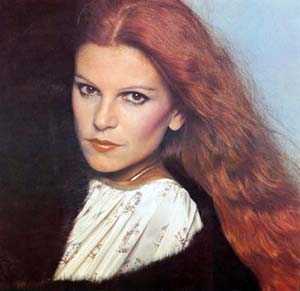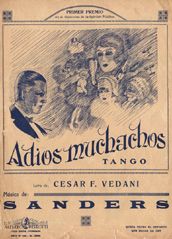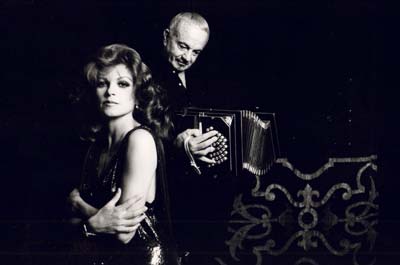By
Adiós muchachos - Milva and “Adiós muchachos”, a prison tango

preading tango abroad has not always been beneficial to tango. Many times it has been danced in a way that has nothing to do with our way of dancing it. Other times it has been played in a strange rhythm and —what here concerns us— on several occasions its titles and lyrics have been changed.

Let us say, to produce a few examples, that in the United States “El choclo” was known as “Kiss of Fire” and also, in a version less played, “The Owl”; “Barrio reo” was changed into “Send her some roses”; “Yira yira” instead was “Marching on”; “La cumparsita” was changed for “The Masked Woman”; “Nostalgias” for “My Lost Love”; “Derecho viejo” for “Disillusioned” and “A media luz” for “When the light is soft and low”, and in another version as “Love Light”.
The renowned “Adiós muchachos” in England had two titles at least: “I’ll Always Keep You In My Heart” and “Paul The Dreamer”. When in his country Louis Armstrong recorded it for the Decca label on July 24, 1951 Dorcas Cochran was mentioned as the lyrics writer –who also appropriated the melody. And the original title was changed into “I get ideas”, but we think it is better to translate it as “I Remember”, according to the sense of the text.
However, there was another previous version in the United States by Carol Raven and published in 1931 by the Edward B. Marks Music Corporation under the title “Farewell companions”. Those lyrics pretended to be translation of the César Vedani’s words but the lines that really coincide are just a few.
The following are the ones that keep a closer meaning:
«Farewell, companions of my life / when youth was glowing / you´ll soon know that I must part (...) I resign myself / to Fate I bow my head; / my desperate heart can’t resist any more (...) bless me in your hearts / and know we won’t be apart, / ‘cause wherever I may be, I’ll too bless thee».
 In Italy it keeps its original title and it was not even translated. The version that belongs to Eugenio Rondinella has not even the least trace of the lyrics written by Vedani. A plain freak of criminal kind.
In Italy it keeps its original title and it was not even translated. The version that belongs to Eugenio Rondinella has not even the least trace of the lyrics written by Vedani. A plain freak of criminal kind.
It was recorded by the female singer Milva. For her interest towards tango music she can rightly be called «an Italian that loves Buenos Aires». Daughter of a seafood trader and a chorus girl, she was born in the locality of Goro, province of Ferrara, on July 17, 1939. Her true name was María Ilva Biolcatti. At age 16 she began to study singing with important teachers.
At age 18 she won the first prize at the New Voices contest organized by the RAI. Then she recorded her first disc and was known as The Panther due to her passion and her abundant hair. In 1962 she was attracted to tango. She won at the San Remo festival with “Tango Italiano” which was not a translation of a number written in the River Plate but a true Italian tango. Then tango was a beat widely dug by Italian musicians and lyricists. She was nominated as the best singer of the year.
In 1985 she appeared at our Teatro Ópera accompanied by Astor Piazzolla. It was her third travel to Argentina. She had already come here in 1966 and 1973. Then she said: «It was in 1973 when I really tried to capture the canyengue aspect of tango».

Musically linked to Astor Piazzolla, at the time of her last visit she had already performed forty concerts in Germany. From there they went to Paris to appear at the Des Bouffes du Nord. Besides the above ones they made 15 appearances in Italy and in other countries. Ástor said: «I think she is the singer that best interpreted my numbers».
She recorded two long-playing records with tango music, one in her country and in her language, with the orchestra led by Iller Pattacini. Our tangos were: “La cumparsita”, “A media luz”, “Bandoneón arrabalero”, “Inspiración”, “Adiós muchachos”, “Duelo criollo”, “Rodríguez Peña”, “El choclo”, “Poema”, “Adiós pampa mía”, and the Rixner’s German tango: “Nothing Above Us But The Blue Sky” and the American tango: “Blue Tango” with lyrics by Mitchell Parish and music by Leroy Anderson.
She cut the second long-playing record with the accompaniment of the Piazzolla’s Quinteto de Tango Contemporáneo. There we find her interpretations like “Balada para un loco”, “Balada para mi muerte”, “Los pájaros perdidos”, “Che, tango, che”. In her songbook also were included “Za” and “Oblivion”, “Mi Buenos Aires querido” and others.
The above mentioned criminal words of “Adiós muchachos” by E. Rondinella are the following:
Goodbye boys, I’m not free anymore,
we’ll see each other in a year or more.
But come to see me whenever you like,
if you don’t have anything pending with the cops.
Goodbye boys, freedom is gone, the cops don’t wait.
I’ll also learn what prison means,
and when I come back I’ll change my name.
We’ll celebrate as usual
with a party for the one who returns,
we’ll make a toast together
and all will come to an end.
To spend more than a year in a prison cell
must be a little bit tough,
but I’ll find the strength.
People from the neighborhood will come,
some friendly people,
and that way time will fly in jail.
Look for a nice name for me
when I return,
because I won’t be free again.
An unusual text. What would Julio César Sanders and César Vedani think?